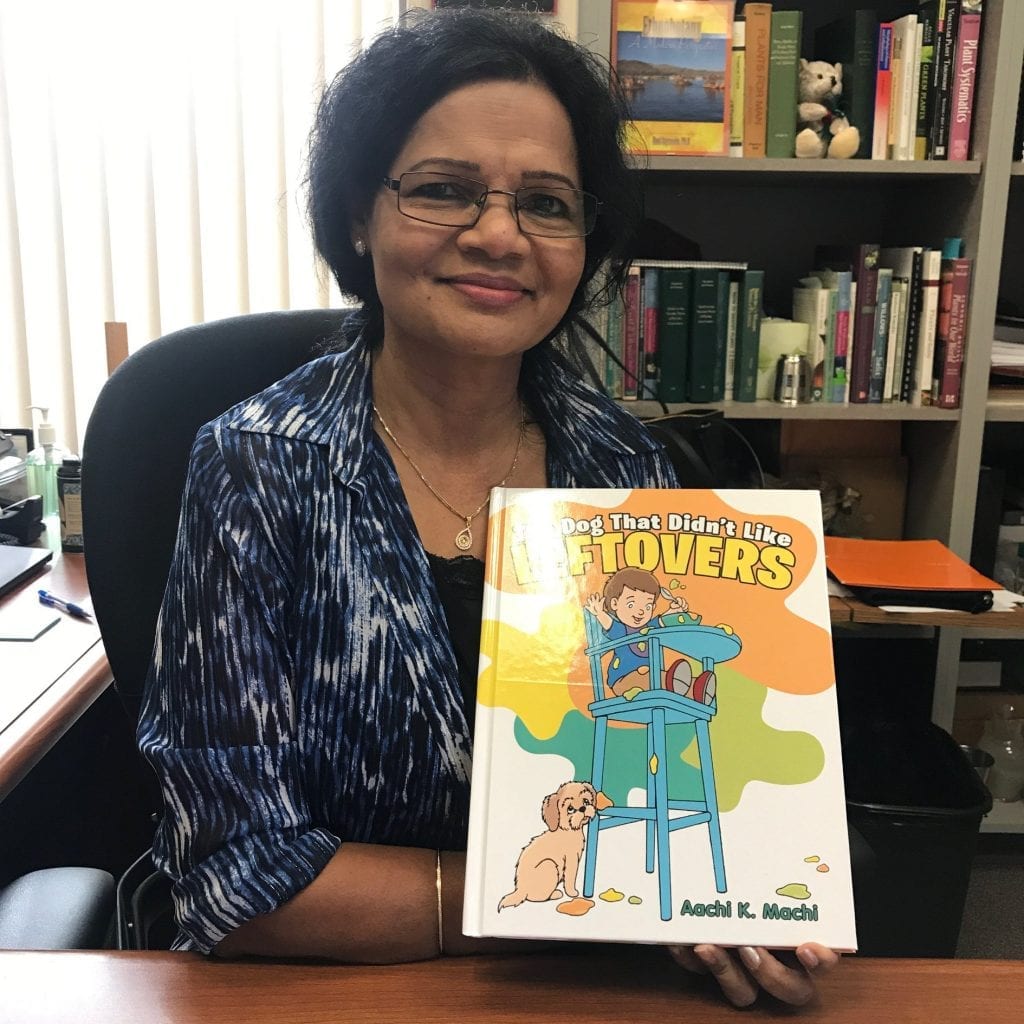Fruits and Veggies Made Friendly

Photo: Anna Araujo
How many books on nutrition do you remember reading during your childhood? Probably not many, since UCF Biology faculty Rani Vajravelu, Ph.D., wrote one of the first. Her recently published book, The Dog That Didn’t Like Leftovers, encourages young children and their families to open a dialogue about healthy eating.
The book follows Lucy the dog on an adventure to help her young, human friend eat healthier. Her trek through the garden introduces the reader to an abundance of talking fruits and vegetables, all of whom are very eager to share the tastiest and healthiest ways to eat them.
The story captures the basics of nutrition in an easy-to-understand manner, so young readers are inspired to think about the food they consume. Adult readers may even learn a thing or two, too.
“I had to bring the science down to a kid’s level,” she said. “You don’t know how kids will take it. I had to find ways to bring an interest in plants and get the phobia out of eating healthy.”
Vajravelu is not new to the publishing world. She has published her own botany textbooks, as well as scientific papers. But a children’s book was new territory.
“It was a little hard to write a children’s book,” she said. “It was challenging to write to the kid’s levels and keep the sentences small, while putting in things that interest them and pull them into the story.”
Children will certainly be pulled into the world of nutrition, thanks to the friendly approach Vajravelu uses. The illustrations, outlined and described to an illustrator by her, help bring the world to life, creating a story which stands out among other children’s books.
“I didn’t find any children’s storybooks out there based on plants or nutrition,” she said. “There are books about animals, or atoms, or space, but none about plants. I wanted to write about plants.”
Vajravelu self-published the book, working on it little by little over the course of six months.
“I would dedicate weekends and mornings, waking up at 4:30 a.m. to work on it before work,” she said. “You have to be very organized and persistent, and very, very dedicated.”
When it was completed, she used the pen name Aachi K. Machi, something which includes callbacks to her past.
“I’m originally from Southern India,” she said. “Aachi refers to a woman who is kind, loving and wise. It denotes respect out of love. My mother used to be called Aachi, so it’s a way to remember her and keep the name from being forgotten in the coming generations. The second part, Machi, is derived from a nickname in my childhood. No one calls me by that name anymore, but I didn’t want it to be lost.”
Now, the name is immortalized in print forever, making an impact on new generations of children. Holding the final copy of the book, Vajravelu couldn’t help but wonder what else she could have done.
“There was a little anxiety,” she said. “I was more anxious than happy, worried there would be a glaring mistake or problem. So I would say holding the final copy was definitely a mixed feeling of joy and anxiety.”
Now that the book is out for sale, purchasable on Amazon or the publisher’s website, Vajravelu is donating part of the proceeds to UCF’s Creative School for Children, hoping it will help the children of UCF’s faculty and staff begin the path to eating healthier.
“I didn’t write this book for profit,” she said. “My primary goal is about healthy eating. It should not be a burden on any family. It’s something fun you should do. If you start at an early age, children won’t be afraid of nutrition later on in their life. I just hope my book will be useful for families.”
The Dog That Didn’t Like Leftovers can be purchased here: https://www.amazon.com/Dog-That-Didnt-Like-Leftovers/dp/148085591X
